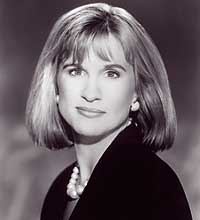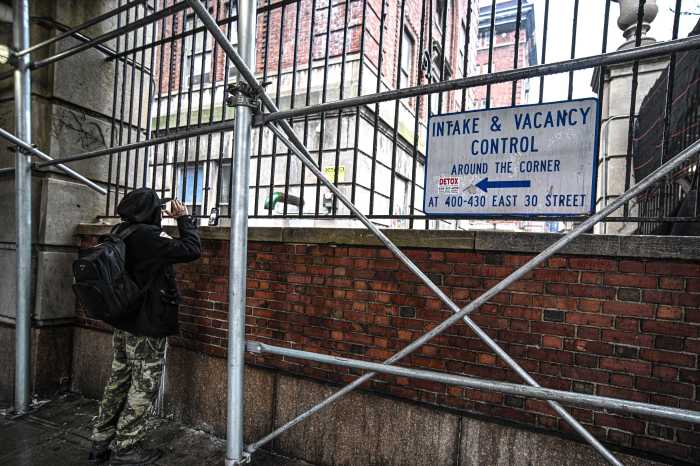Musicians of the Brooklyn Philharmonic Orchestra, who for
five months have been in negotiations for a new contract, charged
the orchestra’s management this week with locking them out of
performances.
The musicians’ union, Local 802 of the American Federation of
Musicians, aired their dissatisfaction over the latest contract
offer from the Philharmonic’s management by alerting the press
Friday and by handing out leaflets to audience members at Philharmonic-produced
recitals on Feb. 15 and Feb. 16.
As ticket-holders walked into the Baptist Temple Church at 360
Schermerhorn St. to attend a recital by pianist Stewart Goodyear
– which, as reported here
last week, was a last-minute replacement for two Philharmonic
performances originally scheduled for the Brooklyn Academy of
Music opera house – union members handed them fliers urging that
they call the Philharmonic’s office "and tell them to play
fair and bring back the musicians!" In alluding to the replacement
recitals by Goodyear, who is not a union member, the union charges
that Brooklyn Philharmonic musicians "have now been locked
out and replaced with a piano."
According to a statement released by the union, "Orchestra
members, represented by Local 802 of the American Federation
of Musicians, have been trying to negotiate a fair settlement
with the management of the Brooklyn Philharmonic similar to that
reached with other local orchestras. However, instead of negotiating
a fair contract with the union, the Brooklyn Philharmonic has
chosen to impose their offer and lockout the orchestra."
The contract between the musicians and the Brooklyn Philharmonic
was up for renewal on Sept. 11, 2001, according to Catherine
Cahill, the Philharmonic’s executive director. She said the orchestra
was not locked out of last weekend’s concerts. The concerts were
canceled, Cahill said, and replaced with the piano recital because
of budget shortfalls.
"We are implementing a final offer of work," she said.
"We are scheduled to do concerts in March and April, but
with a downsized orchestra in March. We don’t have the money
to have the season we announced." The March concert will
employ 21 players instead of 55, Cahill explained.
According to Local 802, its members were already pitching in
to help the Brooklyn Philharmonic and other orchestras by not
taking a wage increase for the coming year.
"Understanding the economic difficulties some cultural institutions
have faced since the Sept. 11 terrorist attacks, Local 802 has
offered each of the orchestras a one-year wage and benefits freeze,
giving time for these cultural institutions to bounce back financially,"
the Local 802 statement reads.
According to Cahill, the Philharmonic said they would like to
sign a four-year contract with the union, with the first year
a freeze and over the next three years, a 14-percent pay increase
over the scale ($35 per hour of rehearsal, $175 per concert per
musician). The union, she said, countered with a three-year contract
with the first year a freeze, and a 14-percent increase over
the next two years.
"That was the deal they signed with the New York Pops,"
said Cahill. "We then offered the Pops deal in toto"
she said, pointing out that it was "more than a cost of
living increase."
"We guaranteed them the increase – which is a big sacrifice,"
said Cahill. "I’ve taken a personal, massive pay cut and
so has [conductor] Bob Spano."
Tops with the Pops
James M. Johnson, executive director of the New York Pops, discussed
his organization’s experience negotiating with Local 802.
"With regard to the union, we negotiated from the standpoint
that this year was uncertain, and we expected funding would be
down somewhat," said Johnson. "We were able to negotiate
a good compromise. They provided us with a freeze in wages, and
we felt that was important gesture on the musicians’ part, and
we appreciate what they’ve done for the New York Pops.
"They way we – myself and the board – looked at it, the
increases in year 2 and year 3 were fairly steep, but over three
years, it averaged less than 5 percent," said Johnson. "We
felt the terms were acceptable at that time. Neither side ends
up with all that they’d like, but I think we reached a fair compromise."
There are differences, however, in the way the two orchestras
administer their budgets and produce their performances that
make it hard to compare. While their annual budgets are close
in number, the Pops has a $2.2. million budget and the Brooklyn
Philharmonic has a $2.7 million budget, they vary in the particulars.
The Philharmonic scheduled 10 concerts for its 2001-2002 season
and the Pops scheduled two dozen. But both Cahill and Johnson
agree that the nature of the Philharmonic’s concerts make them
more expensive.
"They have a very large orchestra and a lot more rehearsals
due to the nature of the repertoire," said Johnson, explaining
that the Philharmonic regularly performs new or rare works which
require much more rehearsal time, while the Pops performs more
familiar time-honored American favorites.
"The Brooklyn Philharmonic has an important place because
their orchestra is for the residents of Brooklyn," said
Johnson. "Certainly there are precedents for having many
orchestras – in Munich, which is smaller than New York, there
are four or five full-time orchestras. In London, five full-time
orchestras. Brooklyn brings a different perspective on music
than the other New York orchestras."
Cahill said that orchestras in Phoenix, St. Louis and Toronto
have all taken pay cuts in their contracts. "They all offered
relief to help those institutions survive," said Cahill.
"Why not in Brooklyn?"
Benefits package
The Local 802 statement does not say whether the Philharmonic
made the same offer as the New York Pops, but reads: "The
Brooklyn Philharmonic, apparently not satisfied with the freeze,
has insisted on givebacks (beyond the one-year wage freeze),
such as the elimination of hospitalization coverage that Local
802 musicians find absolutely unacceptable "
According to Cahill, that statement is misleading because the
Philharmonic pays into a health, pension and welfare fund run
by the union. Cahill said that out of the other 10 orchestras
Local 802 works with, only one other, the American Composers
Orchestra, offers a hospitalization provision. Cahill said it
was unfair to expect the same hospitalization benefits from the
Brooklyn Philharmonic because it is experiencing a $750,000 budget
shortfall.
Cahill said that a previous Philharmonic executive director had
agreed to generous hospitalization benefits, and now the Philharmonic
is asking that it not be included in the new contract.
According to Johnson, in the contract the New York Pops and Local
802 agreed to in December, the Pops does not pay hospitalization
insurance.
"I hope that in the future, the union could find a way to
provide hospital insurance for members," said Johnson. "On
the other hand, the non-profits are never flush with money. It’s
always tough for them. None of the freelance orchestras have
multimillion-dollar endowments. There isn’t money to pay expensive
benefits, or rather, that money has yet to be identified. It
is a problem, and in a better world, there would be hospitalization
coverage, too."
"We raise money to put on concerts, education and make recordings,"
said Johnson. "We raise money to make music, and we try
to produce concerts we feel we can raise the money for."
According to Cahill, the union is also demanding a guarantee
of work, which was not included in the New York Pops agreement.
"That means if we cancel a program, we pay a penalty – the
value of the concerts. Yet all others can cancel without a penalty.
This costs us and doesn’t cost anyone else [of the 11 total Local
802 orchestras]. The union wanted the guarantee of work from
all 11, but they withdrew it from the New York Pops."
Local 802 President Bill Moriarity declined to comment, according
to spokeswoman Heather Beaudoin, because the union and the Philharmonic
"are going back to the table on Thursday and we don’t want
to negotiate in the press."
The union did, however, issue its press release, which Cahill
said was "quite inaccurate in the majority of its content."
"Our goal is to restore the orchestra and stay alive,"
she said. "Our goal is to settle this fairly. Everyone is
part of the solution – it’s that or bankruptcy."
"There is every reason to support [the Brooklyn Philharmonic],"
said Johnson. "I think the leadership on the staff level
– Cathy Cahill – is excellent. I know them by reputation and
they are bright people and working extremely hard to keep the
orchestra going. It would be a shame for the organization to
go away.
"Compromises can be reached," Johnson added. "In
my dealings with the union, they were extremely fair. No foul
play. Local 802, like many unions in New York, have a reputation
for being tough, but fair."
Cahill said she was upset that "leadership within the musician’s
committee" has been heard to say that they would rather
"bring the Philharmonic down" than agree to the New
York Pops deal. She said she’s also worried that the union’s
public complaints "are pitting subscribers and donors against
the orchestra.
"Our goal," she said, "is to make music in Brooklyn."

























